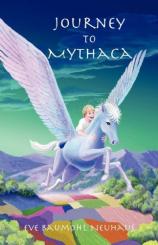Reading Group Guide
Discussion Questions
Journey to Mythaca

1. At the beginning of the story, Ivan comes into the storyteller's living room as the old man is about to start a story. The boy glances at the clock, "though he knows its hands won't move during the telling." What does this indicate about the nature of time in stories? How many different kinds of time can you think of? How do they differ? What makes time stand still? What makes it slow down or speed up? What does, "Once upon a time," mean to you? How much control do you think we really have over time?
2. When the storyteller says the story opens in a world where magical beasts don't exist, Ivan thinks he's come to the wrong story. The storyteller then says, "or at least, no one knew they existed," and Ivan, much relieved, decides it's probably the right story after all. Can you think of an example of something you didn't believe in until you experienced it yourself? Do you believe in things or ideas that science can't prove? Where do you draw the line between what's imaginary and what's real? Do you think it's useful to believe in things that can't be proven?
3. The children are told that, so far, an inscrutable enemy has foiled every quest for Mythaca. Because it appeared as a winged serpent calling itself Maya a few times, the name stuck, but Mythaca's nemesis really has no set name, shape or gender, nor can its motives be easily understood. Ivan is so upset by the intangibility of such an antagonist that he almost quits the quest before it begins. Can you think of any examples of intangible or shape-changing enemies you have fought with in your own life?
4. Pyralis asks the travelers to share what they've learned on their journey before they receive their gifts. Marianna can't put what she learned into words, yet Pyralis gives her a gift anyway. What do you think she learned? Discuss the lessons each traveler shares and describe experiences you've had where you learned the same or a similar lesson.
5. Ivan is given a perspectus, a sort of helmet that will let him see from the point of view of anyone or any thing once he learns how to use it, and Marianna receives the gift of languages, with which she will be able to understand the language of anybody or anything. Can you think of a situation in which a perspectus or the ability to understand any language would be useful? Which of the two gifts do you think is the more valuable? If you had one or the other, how would you use it? Imagine a situation in which you have one of the gifts and describe your experience.
6. Journey to Mythaca begins with a quote by the poet, Muriel Rukeyser, "The universe in made of stories, not of atoms." In the story, Paracelsus tells Ivan, "Our lives are stories. We live stories." What do you think Rukeyser and Paracelsus mean? What are some of the stories told in your family that you live by? What are some of the important stories our culture tells? What stories are told in our churches, our schools? By our politicians? How do the stories we believe affect the way we act? How do stories connect us? Is it possible to change the stories we live? How would you go about trying to change a story you have always believed? Some people believe that changing the story can save the earth. How could that be possible?
7. Two magical worlds are described in Journey to Mythaca, the upper world, where the children first meet the beasts, and the lower world, Grund, where Ivan and Magellan go on their own. What are some of the differences between the two? How is each of them like or unlike our own world?
8. In the end of the story, the travelers reach Mythaca. Or do they? What do the magical creatures think Mythaca is? What do you think Mythaca is? Do we all have a personal Mythaca we're searching for? What does your own Mythaca look like? What kind of journey would you have to take to reach it? What magical gift would you find useful along the way? Tell a story about your journey so far. Is your Mythaca very far away?
Journey to Mythaca
- Publication Date: October 16, 2006
- Paperback: 348 pages
- Publisher: WingSpan Press
- ISBN-10: 1595941010
- ISBN-13: 9781595941015







